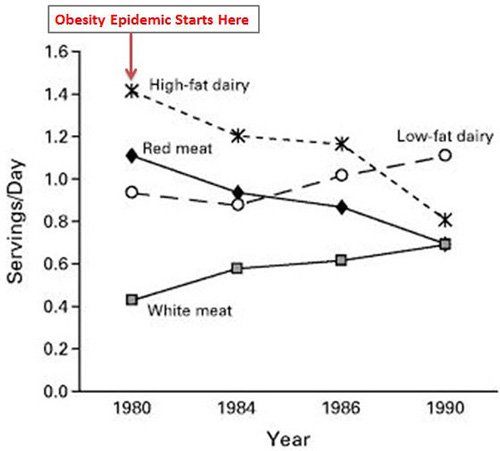You’ve probably heard the success stories of people swapping out dairy and losing drastic amounts of weight, or switching from cow’s milk to almond or coconut milk and curing their gas, bloating, and upset stomach. And perhaps this has lead you to believe believe that dairy is bad, and best left out of the diet…?
You’ve probably also heard that a lot of the positive research on milk and milk byproducts is heavily funded by the dairy industry. And similar to grains, you’re thinking maybe this is the governments way of supporting the local economy, regardless of what it means for our health…?
Or maybe you’ve heard none of these negatives, and you’ve been loving your glass of milk since you were a kid. But often thought of cutting back, because you’re convinced it’s to blame for that extra layer of body fat that seems to be getting worse with age…?

The truth is, that daily glass of milk might have to do with your excess body fat, but not in the way you think it does.
And yes, weight loss and gastrointestinal health can be improved with the elimination of dairy products, but there’s no need to remove them entirely. Since:
The problem with dairy isn’t so much the dairy itself, but the way it’s been altered to fit the low-fat dogma of the last 50 years.
Or put another way – our unjustified fears of dietary cholesterol duped us into removing the beneficial fat from dairy that would have otherwise:
- Provided a nice dose of health-boosting CLA and butyrate
- Helped us absorb essential fat-soluble nutrients
- Controlled the insulin and glucose spiking from the whey and lactose
And similarly, we’ve been told to avoid the higher-fat options, like aged cheese, heavy cream, and butter, which would have kept us satisfied from our meals, satiated between our meals, and less likely to grab a blueberry muffin 2hrs after breakfast.

The sad part is, dairy was initially blamed for increasing cancer and heart disease – with research showing increased rates of both across various populations (1, 2, 3, 4), and scientists chocking up the increased risk to protein (casein specifically) and growth factors (IGF-1), and saturated fat and cholesterol elevations. But that was before they recognized that disease risk was only escalated for those consuming the low-fat or skimmed dairy options (1, 2, 3, 4). For instance:
- In 2004, data from the Nurse’s Health Study that was published in the International Journal of Cancer showing that women drinking 1 or more servings of skimmed milk per day had a 32% higher risk of all forms of ovarian cancer, compared to those who had 3 or less per week.
This is because individuals consuming the dairy products without the fat, were not experiencing the cancer-reducing effects of CLA (1, 2, 3), the heart-health support from HDL cholesterol (1, 2), and the increased absorption of biomarker-improving essential nutrients (1, 2, 3).
Similarly:
- A study from 1993 in the British Journal of Nutrition (Caerphilly Study) determined that men who drink a glass of full-fat cream every day have 1/10th as many heart attacks as those who drink none
- In 2010, researchers in the Annals of Internal Medicine found that those consuming full-fat dairy lowered their risk of type 2 diabetes by over 60%!
And interestingly, this helped explain why pre-1970, the health and body composition of the majority was drastically better than what it is today (despite using plenty of butter and cream). Since the fat they were consuming was actually protective against obesity, diabetes, and heart disease (1, 2, 3).

Now, this isn’t to say you should start drinking 3 glasses of milk per day! It’s saying:
When it comes to dairy, the benefit is in the FAT!
So if you’re going to consume it, that’s where your priorities should be.
Heavy cream, aged cheeses, and butter is where you’ll get everything that’s good about dairy, while skipping out on anything that could be bad. Which in the case of your body composition, means the lactose and whey – since one is a sugar, and the other can spike your insulin levels (1, 2) more than sugar!
For those that are relatively lean and insulin sensitive, consuming whey-containing dairy (or even whey-protein powder) is encouraged in and around weight-training, as it increases muscle protein synthesis and promotes muscle development. But outside of that, and for those with any degree of metabolic derangement, the full-fat options are best for your health and body composition.

Luckily, these are also the options lowest in lactose. So, even those that struggle to digest it (65% of the population), will be fine with these options. Especially if they follow my principle in Live It NOT Diet!, to:
Treat it as a Condiment – for Fat and Flavor.
Stay Lean!
Coach Mike
RELATED ARTICLES:
Why You Should Avoid Seed Oils
Low-Fat vs Low-Carb - What's To Debate?
Building Muscle? Do Post-Workout The Right WHEY
No Salt, Butter, Red Meat, or Coffee? Doc's Got It All Wrong
New Dietary Guidelines - 8 Ways The U.S. Government Failed AGAIN
